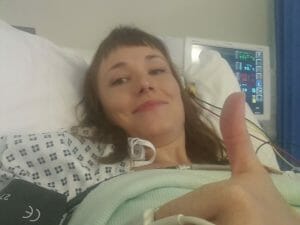In November 2015 CRY did a screening programme at my place of work. I had no symptoms but went along and they found an atrial septal defect (hole in the heart), a congenital heart defect I’ve had since birth. Due to the increased volume of blood, the right atria was enlarged which, in time, would likely be damaged and it was the consultants opinion that it should be closed.
I was referred to my local hospital Wrexham Maelor for tests over the next 18 months or so, then I was referred to The Heart Centre at Manchester Royal Infirmary for surgery to close the hole.
My surgery was on 26th July and it involved, a wire being sent through the femoral vein in my leg, into my heart, where it deployed a wire mesh device that sprung closed both sides of the hole. Over time, the heart muscle will grow over this, sealing the hole closed.
From scans, the hole was expected to be 22mm in diameter but in surgery was found to be 30mm!
Since surgery, my heart rate has dropped considerably (around 85 BPM to between 50-65 BPM) and it isn’t pumping as hard. This is because it isn’t having to work as hard to pump enough blood around my body as it is no longer losing a substantial amount through the hole.
The surgeon explained that those who don’t get such holes repaired have their life expectancy reduced by around 10-15 years, preceded usually by many years of heart problems. So, all in all, I’m extremely grateful for CRY and their screening programme. I would never have known about my condition were it not for them and would likely have experienced serious health problems later in life. KEEP UP THE GOOD WORK CRY!

